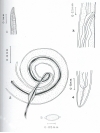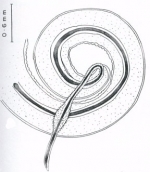NEIHPID
North-East India Helminth Parasite Information Database
Recently added
Parasites
Molecular Data
Trichuris ovis (Smith Smith) Abildgard 1795
Taxonomy
Nematoda »
ADENOPHOREA »
Trichuridae (Ransom, 1911) Railliet, 1915 »
Trichurinae Ransom »
Trichuris Raederer, 1761 »
Trichuris ovis (Abildgard 1795), Smith 1908
Synonyms
(Trichocephalus ovis Abildgaard, 1795)
Host
Capra (hircus)
Habitat
Caecum
Locality
Shillong (Meghalaya), Nongstoin (Meghalaya), Jowai (Meghalaya)
Description
General
In general appearance and most of the body characters T. ovis closely resembles T. globulosa.
Male
Body 44.0-78.0 mm in length, 0.5-.0.93 mm in width across stout posterior part. Posterior end bearing single spicule, latter slightly proximally expanded, pointed at distal end; spicule sheath bearing slightly stretched globular expansion at its distal end; sheath covered with -closely set spines, those on distal expansion of sheath larger than the rest.
Female
Body 58.0-85.0 mm in length, 0.72-0.82 mm in width in posterior one-fourth part. Vulva opening at junction of anterior oesophageal and posterior stout reproductive portions. Vagina long, slender; its lumen widening gradually posteriorly; lumen of distal portion lined with small spines for a little distance. Eggs barrel shaped with polar plugs; latter do not project well beyond the proteinous coat, 0.064-0.073 x 0.032-0.041 mm.
Remarks
Baylis (1939) differentiated T. ovis and T. globulosa on the basis of the size of the spines on the distal expansion of the everted spicule sheath (those on the distal expansion of the sheath being larger than the rest in T . globulosa and vice versa in T. and by the topography of vagina (long and slender with its lumen widening gradually in T. ovis, whereas short and stout with its lumen forming angular bends and opening suddenly into an egg chamber in T. globulosa). However, no size difference was observed in the spines of the spicule sheath in the male specimens of T. ovis examined herein. The males of the two species could be differentiated with reference to the shape of the proximal end of the spicules and also of the distal expansion of the everted spicule sheath. Further, no cuticular inflation was noticed near the head end as recorded by Gupta and Mathur (1968).
Helminthological collections record
NEHU/Z - NM/17
References
Baylis, H. A. (1939) The Fauna of British India including Ceylon and Burma. Nematoda Vol. II (Filarioidea, Dioctophymoidea and Trichinelloidea). Originally published by Taylor and Francis, London (reprinted edition: Today
Gupta, N. K. and Mathur, S. (1968). On the incidence, morphology and taxanomy of some nematodes of sheep and goats from Chandigarh and Madras. Research Bulletin (N.S.) of the Panjab University. 19: pp 291-305




